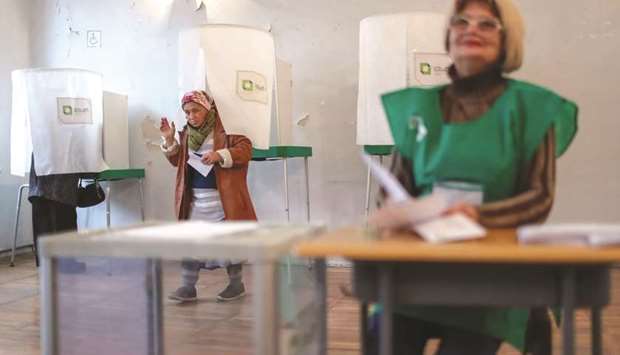Former French ambassador and Georgia’s former foreign minister Salome Zurabishvili, backed by the ruling Georgian Dream party, was in a tight race with opposition leader Grigol Vashadze, another former foreign minister.
An exit poll by US-based Edison Research said the result will lead to a run-off as both candidates garnered 40% of the votes.
A candidate needs to win 50% plus one vote to be elected in the first round.
However, Irakli Kobakhidze, the Georgian parliament speaker and a Georgian Dream leader, told a news conference that an exit poll conducted by his party showed Zurabishvili was set to win in the first round with 52.3% of the vote.
Vashadze had only garnered 28.1%, he added.
Earlier yesterday, Vashadze claimed that the government planned to steal the opposition’s victory by “preparing a mass electoral fraud – vote buying and ballot stuffing”.
He said that opposition observers had documented hundreds of electoral violations in the country of 4.5mn people.
Voter turnout was above 38% at 1700 local time (1300 GMT), three hours before the polls closed, the central election commission said.
Vashadze – backed by exiled ex-president Mikheil Saakashvili’s United National Movement (UNM) and 10 other groups – has been boosted by growing popular discontent over the government’s failure to tackle poverty.
During a fraught campaign, Vashadze criticised the “informal oligarch rule” of Bidzina Ivanishvili, Georgian Dream’s billionaire leader.
Georgia’s richest man, Ivanishvili stepped down as premier in 2013 after just a year in office, but he is widely believed to still be the country’s de facto ruler.
On the campaign trail, Zurabishvili and Georgian Dream slammed the UNM for alleged human rights abuses during its previous term in power.
The presidential campaign is a prelude to parliamentary polls scheduled for 2020.
“The camp that wins the presidential vote gets an upper hand in the parliamentary election,” analyst Ghia Nodia noted.
If elected, Vashadze has promised to mount a campaign for snap parliamentary polls.
Zurabishvili, a stylish 66-year-old independent MP, is the daughter of refugees who fled Georgia in 1921 for Paris after the country’s annexation by the Red Army.
Her career in France’s foreign service culminated in a posting to Tbilisi.
Saakashvili then appointed her foreign minister – with the approval of then French president Jacques Chirac.
But Zurabishvili quickly made enemies among the parliamentary majority, with MPs and some senior diplomats publicly accusing her of arrogance and impulsiveness.
She was sacked after a year in the job, though thousands took to the streets of the capital to protest her dismissal.
She then joined the opposition and became one of Saakashvili’s fiercest critics.
Her main rival Vashadze is a respected career diplomat who served in the Soviet foreign ministry where he helped craft the Soviet-US treaty on the reduction and limitation of strategic weapons.
He was Saakashvili’s foreign minister from 2008-2012.
Vashadze, 60, is married to the celebrated prima ballerina Nina Ananiashvili.
Both candidates have promised to lead Georgia closer to full membership in the European Union and the North Atlantic Treaty Organisation (Nato).
The tiny Black Sea nation has knocked on Nato’s doors for more than a decade but the bloc has not yet put Tbilisi on a path to formal membership, despite a pledge in 2008 that it would at some point be admitted.
The vote is to be Georgia’s last direct presidential poll as it transitions to a parliamentary regime.
The new head of state will be a largely ceremonial figure, and their successor is to be elected in 2024 by a 300-member electoral college.
More than 3.5mn people are eligible to vote in the election, which is being monitored by international observers from the Organisation for Security and Co-operation in Europe.
If the vote goes to a second round, it is to be held by December 1.

